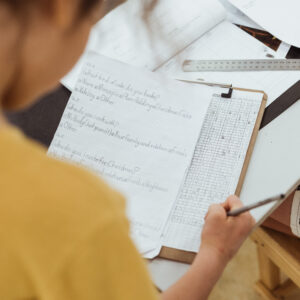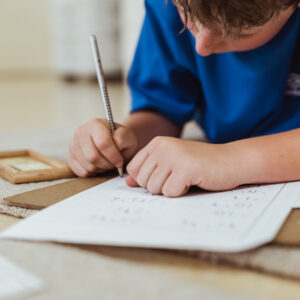Learn more.
Take a tour of our school and see Montessori education in action, or get in touch with our friendly team for more information.
This website may not work correctly in Internet Explorer. We recommend switching to a more secure modern web browser such as Microsoft Edge which is already installed on your computer.
It is a period of consolidation in children’s growth when they interact in a socially conscious way, applying their energies to their chosen activities. At this age, children tend to gravitate towards others in their environment as they are no longer solitary beings, and they often choose to work with their peers on projects of mutual interest.
The ability to function purposefully and productively as part of a harmonious group and, more broadly, the wider world – is at the heart of Montessori education.
Only through freedom and environmental experience is it practically possible for human development to occur.”

Montessori based her educational philosophy on the idea that children develop through a series of four planes. At this age (9-12), children are in the second half of the second plane of development, which means that they consolidate their achievements in preparation for the next cycle.
We promote a more conceptual exploration of the environment as the children move from concrete to abstract learning. We do this through Cosmic Education, which Dr Maria Montessori described as the interconnectedness of all things and a way for children to understand the universe around them. This includes applying reading, writing, critical thinking, discussing, and questioning skills.
Children have the freedom to choose activities within the prepared environment inside the classroom or in the wider nature grounds of the School – these activities may include practising music in the bush classroom, working in the garden, or reading under a tree.
Children’s choices are respected, as we understand that self-reliance, independence, and personality develop while making positive decisions. During their time in the upper primary class, children encounter a variety of learning experiences – combinations of lessons and independent activities, all of which are student-centred.
To enhance their organisational skills as well as their time management skills, students plan their day using their weekly planners and aim to achieve the job they set for themselves for that day or week.

Each term, at the upper primary level, students produce Great Work Investigations, which is individual investigatory research done by each of the students. Students select and research a topic of their choice within the Montessori Great Stories and share it with their peers and teachers in a format of their choice (e.g., written, spoken, visual, tabulated, sculptural, musical, poster, PowerPoint, iMovie, or animation). Over the three years, the students will spend in the Upper Primary Classroom, they will need to complete 12 Great Work Investigations, one for each term.
Like any great research, students first pose questions and, from there, they develop their research, for example:
While the students have a great deal of freedom within their work, we encourage them to follow these criteria over the three years they spend in the Upper Primary Classroom:
The Great Work Investigations align with the requirements of the Australian English Curriculum and aim to prepare students for research, critical thinking, and independent inquiry, which are essential skills for International Baccalaureate and university studies. By engaging in these investigations, students embark on a lifelong quest for knowledge, fostering a love of learning and an appreciation for diverse perspectives.
Our program takes advantage of this period of enthusiasm and cultural awareness by providing a wide range of opportunities for children to explore their culture, and that of others, through the study of history, geography, language, arts and science.
The prepared environment has been carefully designed to entice and inspire children to pursue knowledge in all learning areas – we present children with a well-organised and orderly classroom, which promotes purposeful work, effort and concentration.
Children at this age often suggest, plan, and budget for outings – these might be individual, small groups, or for the whole class – such as attending the Western Australian Symphony Orchestra (WASO) open rehearsals in Perth, visiting the Perth Zoo, and enjoying an exhibition at the WA Museum Boola Bardip.
The primary academic curriculum covers:
“Preventing conflicts is the work of politics: establishing peace is the work of education.”
– Dr Maria Montessori
Take a tour of our school and see Montessori education in action, or get in touch with our friendly team for more information.
